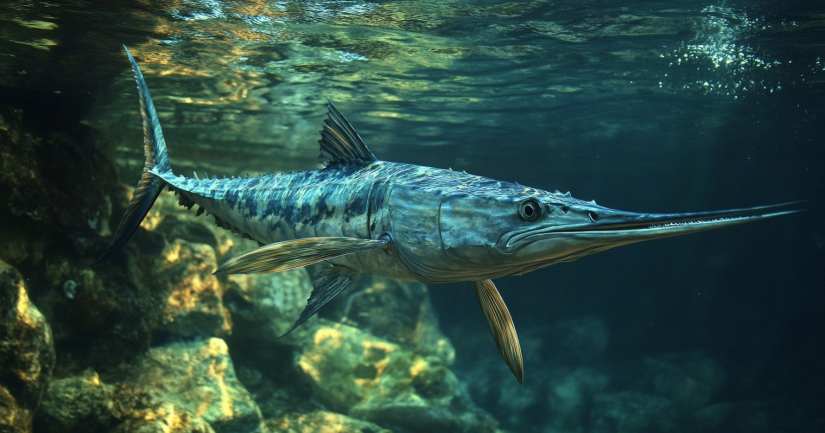
Swordfish Trivia Test Your Knowledge of the Ocean’s Fastest Billfish! With their sleek bodies, razor-sharp bills, and lightning-fast speed, swordfish are some of the most formidable predators in the ocean. These highly migratory fish slice through the water with ease, reaching speeds of up to 60 mph (97 km/h), making them one of the fastest fish in the world. Their powerful, sword-like bills help them slash through schools of fish, stunning their prey before devouring them. But how much do you really know about these incredible creatures? Take our Swordfish Trivia Quiz and put your marine knowledge to the test!
Swordfish belong to the billfish family, closely related to marlins and sailfish. Unlike their relatives, swordfish have flat, broad bills instead of pointed ones, giving them an edge when hunting in open ocean waters. They are highly adapted to life in the deep sea, capable of diving over 2,000 feet (610 meters) to hunt in cold, dark waters.
Swordfish Are One of the Fastest Fish in the Ocean – Their streamlined bodies and powerful tails allow them to reach speeds of up to 60 mph (97 km/h), making them one of the top predators in the sea.
Swordfish are legendary, but the ocean’s wonders don’t stop here! Discover the elegance of stingrays in our Stingray Trivia or swim with the ocean’s powerful migratory fish in our Tuna Trivia.
What Makes Swordfish So Unique?
Mind-Blowing Swordfish Facts That Might Surprise You
- They Use Their Swords for Hunting, Not Spearing – Despite their name, swordfish don’t use their bills to stab prey. Instead, they slash through schools of fish, stunning or injuring them before swallowing them whole.
- They Can Heat Their Brains and Eyes – Swordfish have a special organ near their eyes that allows them to generate heat, improving their vision and reaction time when hunting in cold, deep waters.
- They Start Life with Scales and Teeth—But Lose Them as Adults – Baby swordfish have scales and tiny teeth, but as they mature, they become smooth-skinned and completely toothless!
- Swordfish Are Highly Migratory – These fish travel thousands of miles across the ocean, moving between warm tropical waters and colder feeding grounds in search of prey.
- They Can Grow Over 14 Feet Long – The largest swordfish ever recorded measured 14.9 feet (4.55 meters) and weighed over 1,400 pounds (650 kg)!
- They Are Solitary Hunters – Unlike many other large fish that travel in schools, swordfish prefer to hunt alone, using their speed and agility to outmaneuver prey.
- They Have Few Natural Predators – Due to their size and speed, adult swordfish have very few enemies in the ocean. However, large sharks, killer whales, and humans are among their main threats.
The Role of Swordfish in Marine Ecosystems
As apex predators, swordfish help regulate fish populations, keeping marine ecosystems balanced. However, overfishing and longline fishing practices have significantly impacted their numbers in some regions. Conservation efforts, including sustainable fishing regulations, aim to protect swordfish populations while ensuring that they remain a vital part of ocean ecosystems.
Are You Ready to Take the Ultimate Swordfish Trivia Quiz?
If you love marine biology, deep-sea fishing, or learning about the fastest creatures in the ocean, this Swordfish Trivia Quiz is perfect for you! Whether you’re fascinated by their incredible speed, hunting techniques, or role in the ocean, this quiz will challenge your knowledge and reveal amazing facts about one of the ocean’s most elite predators.
So, are you ready to test your knowledge and dive into the world of swordfish? Take the Swordfish Trivia Quiz now and see if you’re a true billfish expert! 🌊⚔️
Love the ocean? Test your knowledge with the Guess the Sea Animal Quiz, discover your marine match in the What Sea Animal Am I Quiz, or explore more Marine Quizzes for underwater fun!
Swordfish – FAQ
Swordfish, scientifically known as Xiphias gladius, is a large, predatory fish characterized by its elongated, flat bill. It is commonly found in warm waters of the Atlantic, Pacific, and Indian Oceans. Swordfish are highly migratory and inhabit both coastal and deep-sea environments, making them a popular catch for commercial and recreational fisheries.
Swordfish is rich in protein, providing approximately 20 grams per 3-ounce serving. It is also an excellent source of omega-3 fatty acids, which are beneficial for heart health. Additionally, swordfish contains important vitamins and minerals, such as vitamin D, selenium, and niacin, contributing to overall wellness. However, moderation is advised due to potential mercury content.
Swordfish can be prepared in various ways, including grilling, broiling, baking, or pan-searing. Its firm texture makes it ideal for grilling, as it holds up well on the grill grates. A popular method is to marinate the fish in olive oil, lemon juice, and herbs before cooking, enhancing its natural flavor. Cooking times vary, but swordfish is best served medium-rare to maintain moisture.
Sustainability is a significant concern regarding swordfish fishing. Overfishing and bycatch—unintended capture of non-target species—pose threats to ocean ecosystems. Many organizations recommend checking for sustainable certifications, like those from the Marine Stewardship Council (MSC), to ensure that the swordfish you consume is sourced responsibly.
One common misconception is that all swordfish are unsafe to eat due to mercury levels. While it is true that swordfish can contain higher mercury concentrations, consuming it in moderation, particularly for adults, is generally considered safe. Another misconception is that swordfish is only suited for certain cooking methods; in reality, its versatility allows for a variety of culinary preparations.
